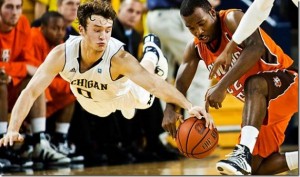Over the years, I have come across many strength training philosophies related to youth athletes strength training and the question always comes up. When should they start working out? The answer is sooner than you think, but take your time and build them slowly.
The American Academy of Pediatrics states that as long as the weights used are not maximal or close to an athlete’s 1 repetition maximum, strength training is safe for young athletes. The Mayo Clinic even weighed with the following statement, “strength training, not weightlifting. “
Here are a couple additional observations, the Russians trained young athletes to perfect movements without weight. That’s right. No weights until they perfected the lifting movements. This lasted up to two years for some. So bodyweight and coordination training until the athlete has a high level of proficiency completing each exercise is your best bet. An example of coordination training would be completing a footwork drill on the agility ladder, juggling one ball, and doing math all at the same time. Your athlete’s coordination and awareness of their body will be challenged, but place a low amount of stress on the athlete’s body.
Secondly, one of the big trends nowadays is the use of plyometrics (i.e. the shock method.) Some athletes are not ready for this method of training. It is too aggressive. How do you know? Athlete’s will start to have naggy-type injuries. More times than not, if you stop the plyometrics, no more nagging injuries. Somebody might say that all the other teams are doing it or I read that plyometrics make athlete’s skate faster. That is a true statement, but the goal is for your athlete to love the game, play pain free and develop the speed over time. One of our athletes started training when he was 9 years old, but he was always getting these nagging injuries, like knee problems, hips hurting, etc. So we held off the plyometrics portion, but continued training. We followed a disciplined training program using the methods mentioned. When he turned 15, we came back to the complete strength program, including plyometrics. He has increased his dead lift, back squat, and bench press by almost 20-25% in only 4 months. And now he is stronger than athletes that are 2-3 years older than him. He is pain-free, no injuries and loving life.
Allow your athlete’s the time to grow and learn where their bodies are in space. Add weights when the time is right. The end result will be a much happier athlete and save their bodies undo wear and tear.
Biography:
Stephen McCarthy, Director of The McCarthy Project, he has worked with over 10000 athletes with an emphasis on the youth athlete. He has researched and developed innovative training techniques for over 10 years. His athletes have received college scholarships and played professionally, as well as, won state championships and national championships. Visit www.themccarthyproject.com.

